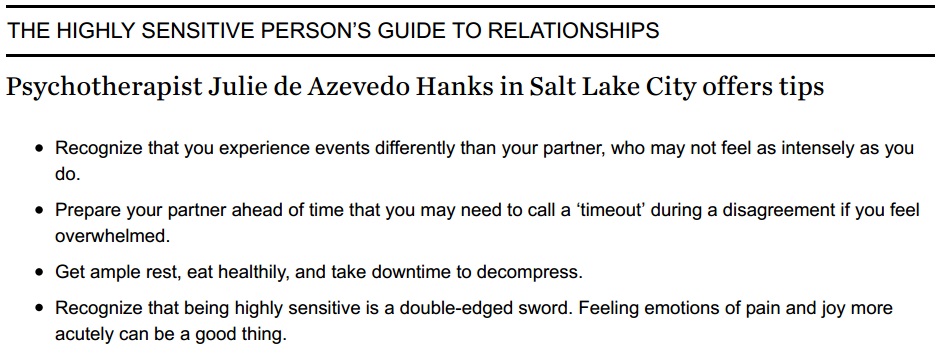Recognize that you experience events differently than your partner, who may not feel as intensely as you
do. Prepare your partner ahead of time that you may need to call a ‘timeout’ during a disagreement if you feel
overwhelmed. Get ample rest, eat healthily, and take downtime to decompress. Recognize that being highly sensitive is a double-edged sword. Feeling emotions of pain and joy more acutely can be a good thing.HSPs can respond more intensely to sounds or crowds; ‘I keep tissues handy at all times’.
By ELIZABETH BERNSTEIN, For The Wall Street Journal.
Michael Hassard, a former engineer for NASA, hikes and camps, takes long motorcycle rides, mows his lawn, fixes leaky faucets, and loves football.
He also cries—quite often: Whenever the Battle Hymn of the Republic is played or if the checkout clerk at Wal-Mart says, “God Bless You;” when the country song about the guy who fixes a tire and refuses payment comes on; and once when he donated some winter coats his children had outgrown to a family he knew from church.
“I keep tissues handy at all times,” says the 44-year-old engineer for an oil and gas company, who lives in Houston. Meet the Highly Sensitive Person, or HSP—someone who responds more intensely to experiences than the average individual. Experts say HSPs process both positive and negative information more thoroughly, and so they can easily become overwhelmed by stimuli. They are acutely aware of sensations, whether of taste, touch, sound or smell. And they are particularly sensitive to emotions —their own and those of others.
Research studies show that about 20% of the population fits into this category, and the trait is found in the same numbers in men and women. HSPs are currently having a moment: Last week, the First International Scientific Conference on High Sensitivity or Sensory Processing Sensitivity was held at the Vrije Universiteit Brussel, with panels on sensory processing sensitivity in children and what we can learn from successful people who are highly sensitive. There is a documentary in the works titled “Sensitive.” (The trailer features Alanis Morissette, a self-proclaimed HSP.)
Mr. Hassard first noticed he was highly sensitive in his early teens. Singing in his church choir, there were songs that he says he “had a hard time getting through” because they moved him so much. Sometimes friends noticed his tears and asked him what was wrong. His rote response: “Nothing, I’m fine.” Eventually, he learned to curb his emotions by playing the songs over and over again in his spare time.

Michael Hassard and his girlfriend Julie Matte, who says she appreciates Mr. Hassard’s highly sensitive nature. PHOTO CREDIT: MICHAEL HASSARD
Sometimes called Sensory Processing Sensitivity, high sensitivity isn’t a disorder or a condition but rather an innate, permanent trait. It was first identified in the 1990s by Elaine and Arthur Aron, research psychologists who developed a 27-item scale to assess it. (Take the quiz to find out if you are highly sensitive.) People who are highly sensitive have a deeper depth of cognitive processing, are easily overwhelmed, have bigger emotional responses and notice subtleties more, says Dr. Elaine Aron, who has a clinical practice in Mill Valley, Calif.
Today, several hundred research studies, from brain scans to genetic analyses, have been done on topics related to high sensitivity. They have found that high sensitivity may occur on a spectrum, just like many other personality traits. It isn’t the same as introversion, although HSPs find the need to withdraw from social interactions or stimuli when their brains get overwhelmed.
Brain-scan studies of HSPs show differences in their neural activity, compared with non-HSPs: HSPs are more empathic, pay closer attention to their environment and are more attentive to social clues from their close friends and partners.
A study, led by researchers at the University of California, Santa Barbara, and published in April, 2014, in the journal Brain and Behavior, found that people with high sensitivity show more neural activity in specific regions of their brains when looking at the face of a loved one than do people with average sensitivity.
The researchers used functional magnetic resonance imaging, or fMRI, to scan the brains of people about to be married, looking at photos of their loved one. They also asked them to respond to questions about their sensitivity levels.
Highly sensitive people showed more activation of their primitive reward system, compared with non-HSPs, when looking at photos of their partner smiling. Another area of the brain concerned with empathic responses was more active when they looked at both happy and sad photos.
The researchers believe this shows that HSPs are more empathic and feel happier when they see their partner happy. “They think more deeply about things,” says Lucy Brown, clinical professor of neurology at Einstein College of Medicine in New York and a researcher on the study.
Experts say that high sensitivity can be found in at least 100 species, including fruit flies, sunfish, dogs, cats and monkeys. In modern times, HSPs make excellent counselors, teachers, artists, pastors and, reporters (or relationship columnists).
The trait has its downsides. HSPs get worn out by too much stimuli. They can become easily hurt or offended. And they have been known to overreact to a situation. “They’re processing information more thoroughly,” says Dr. Arthur Aron, research professor at Stony Brook University in New York and a visiting scholar at the University of California, Berkeley. “So they are more easily overwhelmed.”
Researchers now believe that high sensitivity has a genetic cause. While they haven’t yet identified all the genes involved, research suggests that the serotonin transporter gene—which is involved in the recycling of serotonin, a neurotransmitter in the brain that impacts emotional well-being—plays a role.
They also believe that psychological factors—your temperament or personality—have an effect on your level of sensitivity, as does your physiology, specifically how you respond to stress.
HSPs can learn to cope with their feelings and reactions—sometimes even better than others. A study published online in March 2015, by the journal “Personality and Individual Differences,” looks at how 166 girls ages 11 and 12 respond to aschool-based mental health program in England. It found that those who were highly sensitive benefited from a 12-week class on reframing their depressive thoughts much more than girls who had an average amount of sensitivity.Only the highly sensitive girls’ depression symptoms also decreased over the subsequent 12 months.
“The more sensitive ones were probably more likely to internalize what they’ve learned and apply it,” says Michael Pluess, a senior lecturer at Queen Mary University of London and the lead researcher on the study.
Mr. Hassard admits that sometimes being overly sensitive can cause problems such as “when you can’t hide how much arguing with idiots upsets you.” And he’s sometimes noticed that women he’s dated have become uncomfortable when he is more emotional than they are. “Nobody loves a crybaby,” he says.
Over the years, he has taught himself how to modulate his feelings and reactions—and to “dehumanize” situations to remove emotion. And he has learned to see advantages in being so sensitive. He feels he is a better father because he can empathize better with his children. And he says he recently saved a multi-million-dollar deal at work because he was the only one on his 12-member team who picked up on the client’s apprehension, enabling the group to address it.
Mr. Hassard’s girlfriend, Julie Matte, a surgical nurse, says that although his wear-it-on-his sleeve emotions have taken some time to get used to, she now loves how sensitive he is. “Stoic has its place,” she says. “But engaging, thoughtful conversation about things that matter with someone who feels and isn’t afraid to show it is a welcome and unexpected change from the norm.” Source: The Wall Street Journal.





